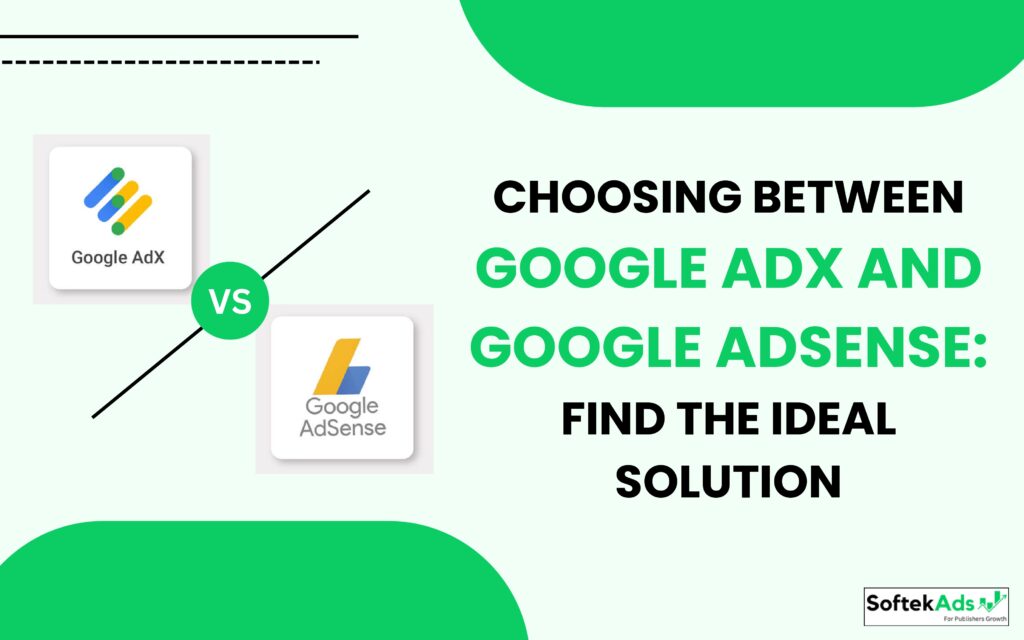Choosing Between Google AdX and Google AdSense: Find the Ideal Solution

Introduction
In the realm of online advertising, Google AdX and Google AdSense stand out as two prominent platforms that offer publishers the opportunity to monetize their websites through programmatic ads. Understanding the differences between these platforms and determining which one is better suited for your specific needs is crucial for maximizing ad revenue. This article delves into the comparison between Google AdX and Google AdSense to help publishers make an informed decision.
Google AdX: Unveiling the Advanced Ad Exchange
Real-Time Bidding Technology
- AdX leverages real-time bidding technology to connect publishers with a wide array of demand sources, including ad networks, agencies, and DSPs.
- This auction-based system ensures that publishers receive competitive prices for their ad space, with advertisers bidding in real-time for the opportunity to display their ads.
Sophisticated Monetization Model
- AdX caters to larger publishers and offers a more sophisticated monetization model compared to AdSense.
- Publishers using AdX benefit from advanced features, real-time bidding, and access to premium advertisers, leading to potentially higher ad revenue.
Publisher Control and Flexibility
- AdX provides publishers with granular control over their ad inventory, allowing them to set minimum bid prices, block specific ads or categories, and prioritize certain advertisers or ad networks.
- This level of control empowers publishers to optimize their campaigns and maximize their revenue potential.
Google AdSense: Exploring the Popular Ad Network
Automated Revenue Generation
- AdSense, the world’s most popular ad network, offers publishers an automated solution for generating ad revenue.
- Unlike AdX, AdSense does not engage in real-time bidding, with prices set ahead of time, simplifying the implementation process for publishers.
Accessibility and Ease of Use
- AdSense is designed for bloggers and smaller websites, offering a self-service ad network that is easy to implement.
- Publishers can place AdSense tags on their websites and rely on the platform to populate their sites with ads automatically.
Revenue Sharing Model
- AdSense operates on a cost per click (CPC) or cost per mille (CPM) revenue model, with publishers earning money for every click or thousand impressions.
- Publishers receive a share of the revenue generated from display ads, with AdSense offering a revenue share of 68% for display ads and 51% for AdSense for Search (AFS) ads.
Key Differences Between AdX and AdSense
Publisher Eligibility
- AdSense is accessible to almost all publishers, regardless of the size of their website or traffic volume.
- AdX, on the other hand, is reserved for larger publishers who meet specific eligibility criteria, such as high traffic volume and quality ad inventory.
Revenue Potential
- AdX typically generates higher revenue for publishers compared to AdSense, attributed to its larger scale and access to a broader pool of advertisers.
- AdSense revenue is influenced by traffic volume and ad clicks, while AdX operates on a more advanced monetization model with real-time bidding.
Making the Decision: AdX or AdSense?
Factors to Consider
- Publishers new to website monetization, with limited traffic and technical expertise, may find AdSense to be a suitable starting point.
- Larger publishers with significant traffic, direct sales, and a desire for advanced monetization solutions may benefit more from AdX.
Revenue Comparison
- In a review of 400 websites, AdX consistently outperformed AdSense in terms of ad revenue generation.
- While AdSense may yield higher RPM in specific scenarios, AdX offers a more sophisticated platform with greater monetization potential.
Conclusion
In the debate between Google AdX and Google AdSense, the choice ultimately depends on a publisher’s specific needs, resources, and goals. AdX emerges as the more advanced and powerful platform, offering sophisticated features, premium advertisers, and higher revenue potential. However, leveraging AdX requires a significant investment in terms of time and resources. On the other hand, AdSense provides an accessible and user-friendly solution for smaller publishers looking to monetize their websites effectively.
By understanding the key differences, revenue potential, and suitability of each platform, publishers can make an informed decision that aligns with their monetization strategy and business objectives. Whether opting for the advanced capabilities of AdX or the simplicity of AdSense, publishers have the opportunity to maximize their ad revenue and drive sustainable growth in the digital advertising landscape.

